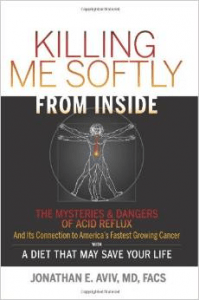Diet, Acid Reflux and Esophageal Cancer
July 23, 2014 | Author: Susan Silberstein PhD
Most of us think of acid reflux as a digestive nuisance that causes uncomfortable symptoms like stomach bloating, gas and heartburn, often triggered by eating spicy food late at night. Some of us treat our heartburn symptoms by going to the local drugstore for over-the-counter medications such as Tums, Alka-Seltzer, Maalox, and Pepto-Bismol. Others of us get relief from the “purple pill.” American consumption of antacids like Nexium, Prilosec, Prevacid, and Zantac is on the rise, paralleling the nearly 50% rise in GERD (gastroesophageal reflux disease) symptoms over the last decade.
But antacids are not necessarily the answer, as frequent and prolonged use can cause irreparable harm to your heart, kidneys, or bones without addressing the cause. And stomach acid burbling up our throats can be more than annoying; it can be life-threatening: A sharp rise in esophageal cancer has its roots in what we eat, says a New York doctor with a new book that covers cause, effect and solution.
Jonathan Aviv, MD, FACS, author of Killing Me Softly from Inside:The Mysteries & Dangers of Acid Reflux and Its Connection to America’s Fastest Growing Cancer, argues that millions of people are suffering not from “heartburn,” but from throatburn. Acidic foods like fried chicken, spicy sausage, pizza, soda and alcohol can do great damage to our health. As you swallow these foods, he explains, “you activate acid receptors in the throat, in the esophagus, and these enzymes basically start eating away your own tissues.” He specifically cautions against the five C’s: caffeine, chocolate, cocktails, carbonation, and citrus.
Aviv, a world-renowned physician, surgeon, and educator, and one of the leading authorities on the diagnosis and treatment of acid reflux disease, cough, and voice and swallowing disorders, draws upon his decades of medical experience to tell the real story of acid reflux and its devastating impact on our health. He explicitly and meticulously connects the extremely acidic, highly processed Western diet to acid reflux disease, and ultimately to esophageal cancer.
According to the National Cancer Institute, this year there will be more than 18,000 new diagnoses of esophageal cancer and over 15,000 deaths. The five-year survival rate for cancer of the esophagus is only 17.5%. Wise dietary choices can make all the difference.
Dr. Aviv says that modern food processing has only made things worse and offers the following example: A fresh banana has a pH of about six, but jarred banana baby food has a pH of four. “That’s 100 times more acidic and that starts in infancy.” How refreshing to find a surgeon who believes in the power of food to heal!
Although among most physicians ignorant of Hippocrates’ mandate to “Let food be your medicine,” the acid/disease connection is considered a “startling breakthrough,” it is very well known to us at BeatCancer.org. We write and talk frequently about acid-alkaline balance, high pH, and creating an alkaline environment in the body that is unfriendly to cancer.
In Killing Me Softly, Dr. Aviv reviews pH basics, lists the pH of commonly consumed foods, and shares compelling patient stories. He also presents his Acid Watcher® Diet, a unique dietary program that combines low acid foods along with high fiber and the three macro-nutrients groups. He helps his readers make delicious, healthy meals by providing easy to follow recipes and meal plans designed to keep the body acid free and in excellent health. Killing Me Softly from Inside is not just another medical self-help book; it may very well be a prescription that can one day save your life.
Join the conversation: Ask Holistic Cancer Coach Facebook Group
References:
[1] http://gerd.emedtv.com/antacids/antacids.html
[2] http://www.recapo.com/dr-oz/dr-oz-advice/dr-oz-acid-reflux-5-cs-killing-softly-review-throat-burn-foods/
[3] http://www.webmd.com/heartburn-gerd/news/20111222/study-acid-reflux-prevalence-increasing
[4] National Cancer Institute SEER Fact Sheets: Esophageal Cancer. http://seer.cancer.gov/statfacts/html/esoph.html
[5] Ostapkovich J. Surgeon Says Food May Be To Blame For Rise In Esophageal Cancer. CBS Philly.com. June 28, 2014. http://philadelphia.cbslocal.com/2014/06/28/surgeon-says-food-may-be-to-blame-for-rise-in-esophageal-cancer/
